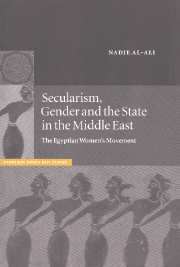Book contents
- Frontmatter
- Contents
- Acknowledgements
- Note on transliteration
- List of groups, networks and organizations
- List of abbreviations
- Introduction
- 1 Up against conceptual frameworks: post-orientalism, occidentalism and presentations of the self
- 2 Contextualizing the Egyptian women's movement
- 3 Self and generation: formative experiences of Egyptian women activists
- 4 Secularism: challenging neo-orientalism and ‘his-stories’
- 5 From words to deeds: priorities and projects of contemporary activists
- 6 A mirror of political culture in Egypt: divisions and debates among women activists
- Conclusion: ‘standing on shifting ground’
- Bibliography
- Index
- Other books in the series
4 - Secularism: challenging neo-orientalism and ‘his-stories’
Published online by Cambridge University Press: 22 September 2009
- Frontmatter
- Contents
- Acknowledgements
- Note on transliteration
- List of groups, networks and organizations
- List of abbreviations
- Introduction
- 1 Up against conceptual frameworks: post-orientalism, occidentalism and presentations of the self
- 2 Contextualizing the Egyptian women's movement
- 3 Self and generation: formative experiences of Egyptian women activists
- 4 Secularism: challenging neo-orientalism and ‘his-stories’
- 5 From words to deeds: priorities and projects of contemporary activists
- 6 A mirror of political culture in Egypt: divisions and debates among women activists
- Conclusion: ‘standing on shifting ground’
- Bibliography
- Index
- Other books in the series
Summary
When I was growing up, secularism – ʿalmaniyah in Arabic – did not mean what it means now. It was used in relation to all the nice things Egypt had been proud of: the 1919 revolution, the Wafd party and so on. All of a sudden, in the last five to ten years, it started to have these terrible connotations. Before that ‘secular’ did not mean being against religion, it referred to the laymen as opposed to religious authorities. Now it is used as an insult by Islamists, who changed its meaning. It's now widely understood as ‘being against religion’, being a mulhid [atheist]. Farag Foda was the first victim of this distortion, through him the Islamists really forced the idea of a secular meaning a person who has to be murdered because he is against religion.
(Mona A.)Almaniyah is based on the idea fasl al-din wa al-dawla [to separate religion and the state]. It has always been like that in Egypt. Those arguing against it now, do they want an Islamist country like Iran? I do not want to live in another Saudi Arabia or Iran. If you really want to apply the shariʿa like in Saudi Arabia, of course, you will first ban alcohol and you will confine women to their homes. So it won't be the hal [solution] for women. From our point of view, all the public space will be taken away. No Islamic rule would prevent a wife to be beaten. A husband would just beat his wife and then go to the Friday prayer.
(Samia E.)- Type
- Chapter
- Information
- Secularism, Gender and the State in the Middle EastThe Egyptian Women's Movement, pp. 128 - 148Publisher: Cambridge University PressPrint publication year: 2000



